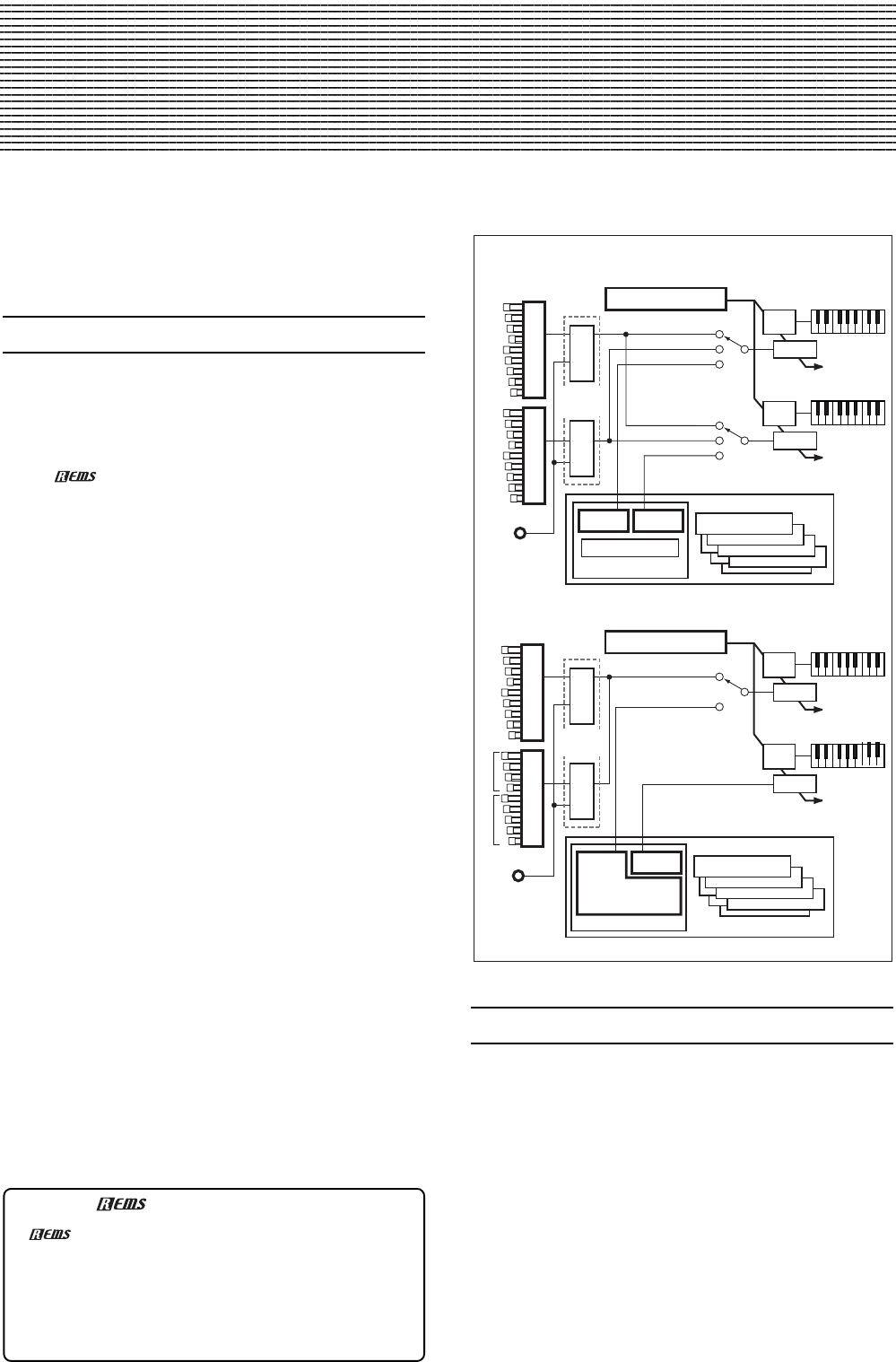
Introduction
5
Introduction
1. About the BX-3
Main features
The BX-3 dual-manual combo organ contains a tone
wheel organ modeling tone generator that produces the
distinctive sound of a tone wheel organ. It provides two
61-note keyboards, allowing you to mimic the perfor-
mance techniques of a traditional tone wheel organ.
Korg's
technology is used to create spatial effects
such as rotary speaker, chorus/vibrato, and reverb,
faithfully simulating the modulated sounds produced by
the turning rotor and horn, the natural overdrive, and
chorus/vibrato to produce the authentic combo organ
experience. The BX-3 is all you need to enjoy real organ
sound.
By operating the two sets of drawbars you can modify the
sound in realtime while you play. The sound is created
using one set of drawbars in Normal mode, or by using
both sets in EX mode. In EX mode, you can introduce
additional tonal and percussion harmonics, letting you
produce new sounds unavailable until now.
A conventional keyboard does not sound until a key is
pressed down all the way, but the BX-3 will sound even
when a key is pressed lightly. The notes will “speak” very
rapidly, as will the glissandi and trills you play.
The BX-3 accurately reproduces the distinctive percussive
attack associated with certain classic tone wheel organs.
You can also adjust the settings to obtain the “contact
arcing” or key click effect when you press or release a
key, providing the sense of attack unique to a tone wheel
organ.
There are 128 internal programs (Normal mode: 64, EX
mode: 64) that let you enjoy a variety of organ sounds.
The BX-3 has two keyboards, UPPER and LOWER. A
separate MIDI channel can be assigned to each keyboard.
To create the sound, the BX-3 uses the two sets of draw-
bars (Drawbar 1 and Drawbar 2) on the front panel, as
well as the drawbar settings specified by the program.
Drawbar settings can also be made via MIDI.
The keys in the DRAWBAR SELECT section let you
choose which set of drawbars is active (see the diagram).
What is ?
(Resonant structure and Electronic circuit Modeling
System) is KORG’s proprietary sound modeling technology
which precisely reproduces the complex character and nature of
both acoustic and electric instruments as well as electronic
circuits in real world environments. REMS emulates a wide
variety of sound generation characteristics including instru-
ment bodies, speakers & cabinets, acoustic fields, microphones,
vacuum tubes, transistors, etc.
DRAWBAR 1, 2
DRAWBAR PRESET
Program
Drawbar
Register
MIDI CC#
Drawbar 1
Drawbar 2
Controller Setting
Rotary Setting
Amp Setting
Reverb Setting
Percussion Setting
EX mode
DRAWBAR SELECT
for UPPER
EX Percission
EX Drawbar
Drawbars and tone generators
DRAWBAR 1
DRAWBAR 2
DRAWBAR PRESET
DRAWBAR 1
DRAWBAR 2
DRAWBAR PRESET
Program
Drawbar
Register
MIDI CC#
Drawbar 1
Drawbar 2
Controller Setting
Rotary Setting
Amp Setting
Reverb Setting
UPPER LOWER
Drawbar Setting
Percussion Setting
DRAWBAR SELECT
for LOWER
Normal mode
DRAWBAR SELECT
for UPPER
DB Preset's Perc
Tone Wheel generator
UPPER LOWER
Drawbar Setting
Drawbar
EX Drawbar
EX Percission
Gate
Mixer
Upper sound
Lower sound
UPPER Keyboard
Gate
Mixer
LOWER Keyboard
Tone Wheel generator
Mixer
Upper sound
Lower sound
Gate
UPPER Keyboard
Gate
Mixer
LOWER Keyboard
DRAWBAR PRESET
The modes of the BX-3
Normal mode and EX mode
In these modes you can select and play programs.
The main differences between Normal mode and EX
mode are given below.
Normal mode
• The sound is created by one set of drawbars
EX mode
• The sound is created by two sets of drawbars
Normal Edit mode and EX Edit mode
In this mode you can edit the program parameters of
Normal mode or EX mode.
Global mode
In this mode you can make settings that affect the
entire BX-3, such as master tune, transpose, and global
MIDI channel.


















